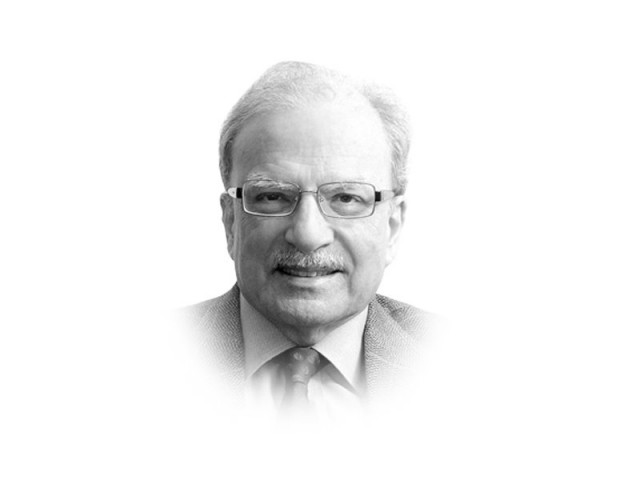The Huntingtonian clash of civilisations?
Many thinkers in the Muslim world today question the validity of Samuel Huntington prediction about the future

The writer is a former caretaker finance minister and served as vice-president at the World Bank
In an insightful article, Mustafa Aykol at the Freedom Centre at Wellesley College reminds his readers of Arnold Toynbee’s article, “Islam, the West and the Future.” The British historian wrote that the Islamic world has been in a crisis since the 19th century since it was outperformed, defeated and even besieged by the West, in particular the colonial European powers. Islam, a religion that has always been proud of its earthly success, was “facing the West with her back to the wall,” causing stress, anger and turmoil among Muslims, wrote Toynbee. He compared the crisis in Islam in his time which was not as deep as it is now with an older crisis: the plight of the Jews in the face of the Roman domination in the first BC. Not unlike today’s Muslims, the Jews then were also defeated, conquered and culturally challenged by a foreign empire. This situation, Toynbee maintained, led to two reactions: One was “Herodianism” which implied collaborating with Rome and following its ways. The other was “Zealotism” which used militant methods to confront Rome.

It is not hard to note the parallel of the Jewish situation with what is happening today in several parts of the Muslim world. Many followers of the Islamic faith have turned into zealots but they are not fighting today’s imperial powers, America and Europe. They are battling the Herodianists in their midst. There is not a war with the West but a war within Islam. Most of those who have died in this struggle are Muslims, not the people in the West. The targets the zealots select are not necessarily those who oppose them. They are chosen randomly as was the case with the bombing in Lahore on February 13, 2017 that took more than a dozen lives. Pakistan has lost many more people than the United States did in the September 11, 2001 terrorist attacks.
Toynbee was persuaded that Muslims of his day were engaged in a similar internal struggle between their own Herodians and Zealots who embody “archaism evoked by foreign pressure.” He saw Turkey’s Mustafa Kemal Ataturk as an “arch-Herodian” and the Central Arabian Wahabists as arch-Zealots. The founder of modern Turkey was leaving archaic Islam behind, opting for modernisation. Toynbee was of the view that the Muslim zealots would be defeated because they were essentially primitive and did not have access to modern technology. Had he been writing today he would have been less dismissive of the Islamic zealots. They were able to use modern communication technologies — in particular social media — to get across their message to fellow Muslims.
In his book, The Islamic Jesus: How the King of Jews Became a Prophet of the Muslims, Mustafa Akyol argues that another lesson from history is more pertinent for the Islamic world of today. According to his telling, “Jesus showed that sacrificing the spirit of religion to literalism leads to horrors, like the stoning of innocent women by bigoted men — as it still happens in some Muslim countries today. He also taught that obsession with outward expression of piety can nurture a culture of hypocrisy — as is the case with Muslim communities today.” Akyol’s description fits Pakistan of today where extreme corruption and crimes such as honour killings coexist with expression of piety.
However, for reform to come to Islam, the global Muslim community must not be provoked from the outside. Unfortunately that is precisely what is being done by Donald Trump’s America. The New York Times wrote an angry editorial against President Trump’s move against Muslims. “The order’s language makes clear that the xenophobia and Islamophobia that permeated Mr Trump’s campaign are to stain his presidency as well. Un-American as they are, they are now American policy,” wrote the newspaper. Of great concern was the wording of the executive order. “The United States must ensure that those admitted to this country do not bear hostile attitudes toward it and its founding principles,” it read. The obvious assumption was that all Muslims should be considered a threat. The newspaper did not accept the notion that this approach would save the United States from the threat posed by extremists in the world Islamic community. In fact, the notion today is “more credible than ever before that the United States is at war with Islam rather than targeting terrorists.
They want nothing more than a fearful, recklessly belligerent America; so, if anything, this ban will heighten their efforts to strike at Americans, to provoke yet further overreaction from a volatile and inexperienced president.” Thousands of people went to the country’s many airports to speak about the new president’s approach to the world, in particular his attack on the world’s Muslim community.
Published in The Express Tribune, February 20th, 2017.
Like Opinion & Editorial on Facebook, follow @ETOpEd on Twitter to receive all updates on all our daily pieces.















COMMENTS
Comments are moderated and generally will be posted if they are on-topic and not abusive.
For more information, please see our Comments FAQ